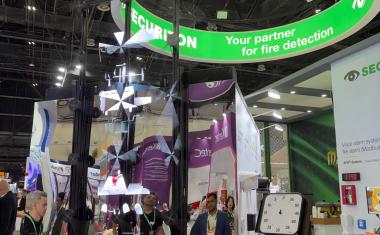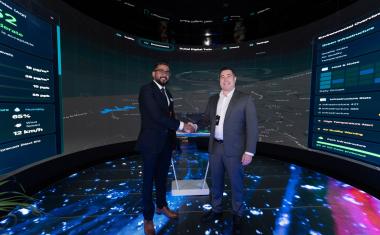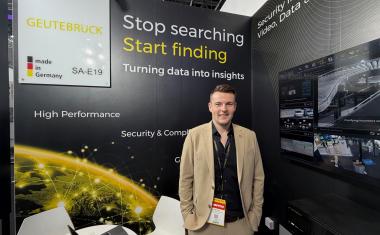BSIA Survey Results Spotlight Strong Middle East Demand for UK Security Solutions
New research carried out on behalf of the British Security Industry Association's Export Council in the lead-up to the recent Intersec 2015 exhibition in Dubai serves to underline ...
New research carried out on behalf of the British Security Industry Association's Export Council in the lead-up to the recent Intersec 2015 exhibition in Dubai serves to underline the strong demand being seen in the Middle East marketplace for the latest security systems and solutions from UK businesses, despite the backdrop of increased international competition. Analysis of the research also brings into sharp focus the key technologies, like integrated solutions, HD CCTV and the much talked about Cloud, that have made a major impact over the past year.
Looking at the specific areas covered by the survey, encouragingly, all of the Export Council's member companies who responded confirmed that they are active in this pivotal region, a figure which is up by 11% year-on-year. Of those questioned, an impressive 62.5% reported that they had witnessed a notable increase in revenues derived from the Middle East over the past 12 months and a further 25% confirmed that business levels were unchanged. Significantly, the outlook for the coming year is even stronger with all members questioned saying they anticipate a rise in orders.
Although not covered in this year's survey, talking to member companies more widely, the countries in the region that continue to generate impressive sales for British products and solutions are, respectively, Saudi Arabia and the UAE. Other geographical areas which are also making a strong impression here include: Turkey, Qatar, Kuwait and Iraq.
When questioned regarding the approach to security technology which they felt had made the largest impact in the Middle East over the past 12 months, security integration came out well ahead of everything else, in fact it was singled out by half of all of those surveyed. Also featuring strongly in the research was, once again, HD and Mega-pixel CCTV on 25%, with Cloud-based solutions - which was making an appearance in the survey for the first time - and multi-voltage power supplies, each being selected by 12.5% of respondents.
Reflecting on the strong push for security integration, Ian Moore, Chairman of the Export Council, reckons that this underlines the increasing recognition amongst BSIA member's customers of the enhanced security, and day-to-day management, benefits that can be unlocked when a number of elements - from access control to video surveillance - can be brought together in a seamless IP environment rather than remaining in their own discrete and unconnected silos. Although the advantages for large-scale and multi-site operations are well documented, Export Council members are also, confirms Moore, witnessing a growing trend for integrated security solutions to be taken-up by medium and even smaller sized enterprises, something which is likely to accelerate even further in the year ahead.
Alongside this, the roll-out of HD and Mega-pixel CCTV cameras continues to prove a popular choice thanks, undoubtedly, to the ability to provide additional detail in security critical applications such as banks and hotel lobbies and changing legislative requirements across the region.
Expanding on why power supplies ranked highly in the research, Moore says that Power Supply Unit (PSU) manufacturers are seeing at first hand the region's desire for energy reduction (improbable as it might seem at first), by offering high efficiency levels that will be realised compared to traditional designs. This also leads to significantly cooler running - a major factor in the region - offering enhanced reliability; and with the region's multiple supply voltages and frequencies (often of an unsteady nature), single units that produce stable outputs under any of these varying input conditions.
Of course as with any research there were a few surprises, specifically the fact that biometrics for access control and VCA (Video Content Analysis) did not feature in the rankings this time around, both of which have scored highly in previous years.
Drilling down to what is actually influencing customer buying decisions in the region, the research investigated the factors which Export Council members were finding on the ground. It was discovered, encouragingly, that compliance with industry standards was ranked as the most important decision-making factor by nearly half of respondents (44.4%) when dealing with Middle East customers, a rise of over 11% - something that has always been a key consideration for BSIA membership. Technological innovation was also singled out by a significant proportion of respondents (22.2%). This reinforces the importance for Export Council members of having a strong R&D base and the desire by customers in the region to adopt leading edge solutions for their security-critical projects. Other subsidiary factors mentioned included: ease of use, return-on-investment, and initial purchase price.
Beyond this, the survey sought to discover which vertical markets were leading the way in taking up solutions offered by BSIA Export Council member companies. It was reported that the top market sector was critical national infrastructure on 33.3%, perhaps not too surprising given that this includes oil and gas facilities which continue to play such an economically vital role in the region. Other stand-out sectors for security procurement in the survey were government (22.2%), which reflects strong public sector activity, transport - with major rail and road projects in the works - plus retail which remains a key economic driver.
Putting forward some thoughts on the survey, Ian Moore, Chairman of the BSIA's Export Council says: "The new Export Council research, which is being unveiled at Intersec, underlines the phenomenal demand out there in the Middle East for the best that British security products and solutions can offer and, specifically, those from BSIA member companies. Moving ahead, it is encouraging to reflect on the high degree of confidence expressed by Export Council members in their prospects for 2015. Significantly, these findings tie-in with the results of our annual 'State of the Nation' survey conducted late last year which confirm that the Middle East is the single most important target market worldwide for BSIA members over the next 12 months, ahead of Eastern and even Western Europe, which falls back into third place."
"Turning again to the latest research, from a BSIA perspective, the fact that members report industry standards ranking highly in the thinking of prospective customers is encouraging," says Moore.
Moore continues:"This makes a welcome change from the perennial focus on initial purchase price and move towards the cost of ownership during the life cycle of the solution." On the technology front, Moore reiterates that it appears security integration is coming to the fore: "This, undoubtedly, reflects the reality that people are taking a broader perspective now when thinking about specifying an optimum solution. In addition, the fact that the Cloud is starting to have an impact on the development of security measures, for example to store and access data from access control to video surveillance, offers food for thought in terms of the best approach to storage. Although in its infancy this is certainly something to keep an eye on for the future." he concludes.









